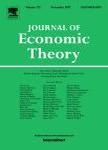-
作者:Agastya, Murali; Slinko, Arkadii
作者单位:University of Sydney; Indian Institute of Management (IIM System); Indian Institute of Management Bangalore; University of Auckland
摘要:We consider an environment in which a Decision Maker (DM) finds it sufficiently complex to even describe the state space, let alone guess the parameters of the underlying data generating process. He is therefore unable to use the standard Bayesian methods. Instead, at each moment in time, the DM constructs a preference relation on the set of available actions based on their past performance. We postulate a set of axioms on this family of preference relations indexed by histories (of rewards). ...
-
作者:Che, Yeon-Koo; Kim, Jinwoo; Kojima, Fuhito
作者单位:Columbia University; Seoul National University (SNU); Stanford University
摘要:We study the house allocation problem in which n agents are assigned n objects, one for each agent, when the agents have interdependent values. We show that there exists no mechanism that is Pareto efficient and ex-post incentive compatible, and the only mechanism that is ex-post group incentive compatible is constant across states. By contrast, we demonstrate that a Pareto efficient and Bayesian incentive compatible mechanism exists in the two agent house-allocation problem, given sufficient ...
-
作者:Qin, Jie
作者单位:Ritsumeikan University
摘要:This study examines the effects of regret on investor behavior and market turbulence by using a model where investors not only regret wrong actions but also regret inaction. We demonstrate that regret aversion can cause investors to ride a bubble, exit and reenter the market, or choose not to trade. Further, herds and partial herds can occur in the market, and we show that the stronger regret over inaction, the easier it is for herds to occur. The model presented herein also predicts that duri...
-
作者:Arieli, Itai; Aumann, Robert J.
作者单位:Technion Israel Institute of Technology; Hebrew University of Jerusalem; Hebrew University of Jerusalem
摘要:Call a perfect information (PI) game simple if each player moves just once. Call a player rational if he never takes an action while believing, with probability 1, that a different action would yield him a higher payoff. Using syntactic logic, we show that an outcome of a simple PI game is consistent with common strong belief of rationality if it is a backward induction outcome. The result also applies to general PI games in which a player's agents act independently, rendering forward inferenc...
-
作者:Steiner, Jakub; Stewart, Colin
作者单位:Czech Academy of Sciences; Economics Institute of the Czech Academy of Sciences; Charles University Prague; University of Edinburgh; University of Toronto
摘要:We study the effect of frequent trading opportunities and categorization on pricing of a risky asset. Frequent opportunities to trade can lead to large distortions in prices if some agents forecast future prices using a simplified model of the world that fails to distinguish between some states. In the limit as the period length vanishes, these distortions take a particular form: the price must be the same in any two states that a positive mass of agents categorize together. Price distortions ...
-
作者:Fujinaka, Yuji; Wakayama, Takuma
作者单位:University of Osaka; Ryukoku University
摘要:We consider the problem of the fair allocation of indivisible goods and money with non-quasi-linear preferences. The purpose of the present study is to examine strategic manipulation under envy-free solutions. We show that under a certain domain-richness condition, each individual obtains the welfare level of his optimal envy-free allocation by maximally manipulating the solutions. This maximal manipulation theorem is helpful in analyzing the set of Nash equilibrium allocations in the direct r...
-
作者:Briest, Patrick; Chawla, Shuchi; Kleinberg, Robert; Weinberg, S. Matthew
作者单位:University of Paderborn; University of Wisconsin System; University of Wisconsin Madison; Cornell University; Massachusetts Institute of Technology (MIT)
摘要:We examine optimal mechanisms for a multi-product monopolist selling n substitutable goods to a buyer of unknown type randomly sampled from a known distribution. The optimal selling strategy assigns posted prices to lotteries (probability distributions over items), and it is known that pricing lotteries can be strictly superior to pricing individual items. Our results quantify the magnitude of this phenomenon and shed light on the computational hardness of determining (or approximating) the op...
-
作者:Mandler, Michael
作者单位:University of London; Royal Holloway University London
摘要:Suppose an agent chooses by proceeding through a sequence of criteria: for any pair of alternatives the first criterion that ranks the pair determines the agent's choice. Given any constraint on the capacity of the criteria to discriminate, choices that maximize complete and transitive preferences are always the outcome of a 'quick' sequence that uses the minimum number of criteria. For any irrational preference on the other hand there is always a discrimination constraint such that the prefer...
-
作者:Flores-Szwagrzak, Karol
作者单位:University of Southern Denmark
摘要:We revisit the claims problem (O'Neill, 1982), where a group of individuals have claims on a resource but there is not enough of it to honor all of the claims. We characterize the rules satisfying three wellknown invariance axioms: consistency, composition up, and claims truncation invariance. They are priority-augmented versions of the standard weighted constrained equal awards rules, also known as weighted gains methods (Moulin, 2000): individuals are sorted into priority classes; the resour...
-
作者:Benhabib, Jess; Bisin, Alberto; Zhu, Shenghao
作者单位:New York University; National Bureau of Economic Research; National University of Singapore
摘要:We study the wealth distribution in Bewley economies with idiosyncratic capital income risk. We show analytically that under rather general conditions on the stochastic structure of the economy, a unique ergodic distribution of wealth displays a fat tail. (C) 2015 Elsevier Inc. All rights reserved.
